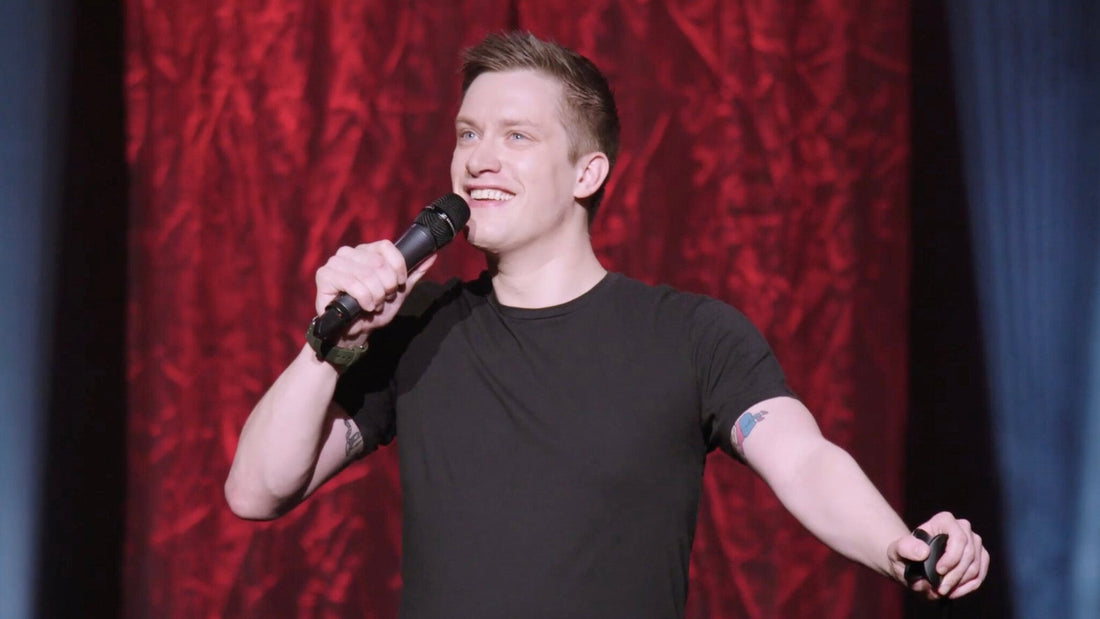In his fifth release, Daniel Sloss explores the line between being a sociopath or a moron in his exploration of identity. Above the arrangement of material, which moves from valuing human life to love, family and sociopathy, Sloss’s pacing is the essential glue of the 60 minutes that makes the act shine so brightly. Even and deliberate, nothing is rushed, and every opportunity is taken to place the audience in an ambiguous, tense middle ground where Sloss unpacks beliefs we culturally share, and considers our inherent virtue. Sloss has come a long way from his breakout Conan set, where his decade-younger self was more wry and playful, relishingly edgy. Instead, SOCiO finds the now 28-year-old Sloss powerfully understated and never rushing a beat or missing a moment, with the comedy and brilliance of it shining brighter for it.

Daniel Sloss hates pulp
Early on, Sloss latches onto the idea of violent killers and the surprise of everyone around them. Sloss offers up that he’d like the news reports to be more along the lines of “This just in, one of the men who was murdered was frequently seen by his neighbors purchasing orange juice that had pulp in it…Good.”
He continues to rail against juice with pulp, asking “who chews juice,” which features as a focal point of the masterpiece denouement at the end.
Sloss failed a test in Reader’s Digest
After a bit that will appeal to all list writers about how no one could love and value all human life, Sloss gets to the heart of his comedy special, and it’s as important what he brings up as what he doesn’t. In discussing sociopathy, details are crucial, but in a comedy discussion of it, details may get in the way of truthiness (the lies told in an act to bend comedy around). A master of the sleight-of-hand punchline, Sloss takes a swing, and opts to focus on the ambiguity of the diagnosis and the degree of the condition. His way in, of course, is to start with the sociopathy of his family per a fake test in Reader’s Digest.
The answer is obvious for logical thinkers, not so much for the emotional ones. Remember back in the early 1990s when people didn't have instant access to online search engines, and therefore weren’t supposed to understand that the test was horseshit? When his grandmother tests the family with the conundrum, she is relieved when Sloss’s father doesn’t get the answer, but has her mind blown when an eight-year-old Daniel does. From there, bits on emotional thinkers, nickel and dime politics, and first world problems build to the bits’ final clever joke “Just because bad things happen other places doesn’t mean I don’t get to have a concept of sadness, man. That’s not how perspective works. Otherwise, I could just walk around kicking people in the balls, and then holding a picture of 9/11, being like, ‘huh, huh. Could be worse.’”
Sloss toys with ambiguity right to the end
However, sociopathy and its nature return towards the final stretch of the show, with
Sloss positing that sociopaths are made, and yet… he clearly wonders if he is one. After all, he says, sociopaths tend not to know they’re sociopaths, and often hide in plain sight. He invites his audience to decide, positing the case for his being a sociopath, suggesting that perhaps he became a master manipulator via stand-up. He builds the tension and the laughs to a thunderous crescendo, painting a vivid, verbal description of what might happen after he inevitably snaps.
In a brilliant, suspenseful hour of comedy, Sloss proves himself to be one to watch again and again, sociopath or not.

Stream Daniel Sloss' comedy album SOCiO available everywhere you listen to comedy!









